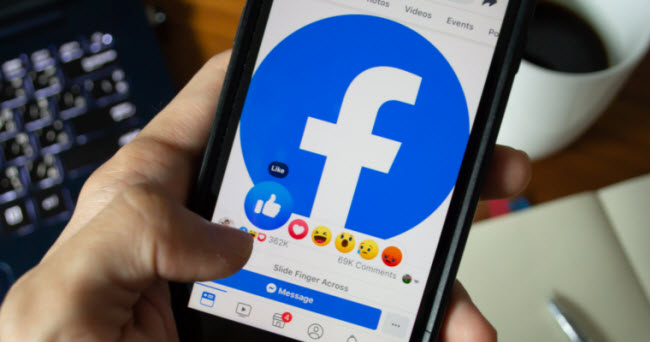Recent statistics indicate that the number of internet users worldwide has surpassed 4.5 billion people, most of whom communicate through various applications, with “Facebook” being one of the most prominent. Facebook offers its users numerous services, including connecting with friends, meeting new people with shared interests, easy access to diverse news sources through pages associated with global media institutions, and supporting commercial activities by providing spaces for selling various products. Given these services, it is natural that the number of subscribers to this giant platform has reached 2.9 billion, making it one of the top platforms for internet users worldwide. Its shares have achieved significant profits on global stock exchanges after establishing itself as an indispensable service and social institution on the internet. Despite these successes and benefits, Facebook has some lesser-known facts and secrets, some of which are positive while others are negative, which we will highlight in this article.
Facebook’s Origins and Early Struggles
Before Facebook emerged, its founder, Mark Zuckerberg, was studying at Harvard University and initially conceived the idea of creating an entertainment site where users could compare people’s faces and choose the most attractive one, planned to be named “Facemash.” However, the idea was disapproved by Harvard’s administration, who threatened to expel him if he continued with it. Consequently, Zuckerberg abandoned the idea.
Zuckerberg’s second idea was to create an online directory for students, named “Thefacebook.” This directory allowed Harvard students to search for others, discover who had attended various classes, connect with friends of friends, and create a social network linking everyone. This idea was implemented and received a positive response from students. Although Thefacebook started as an exclusive directory for Harvard students, it quickly expanded to other universities and schools, eventually including anyone over the age of 13. The first profile picture used on the site was of actor Al Pacino, chosen with a blue background due to Zuckerberg’s red-green color blindness.
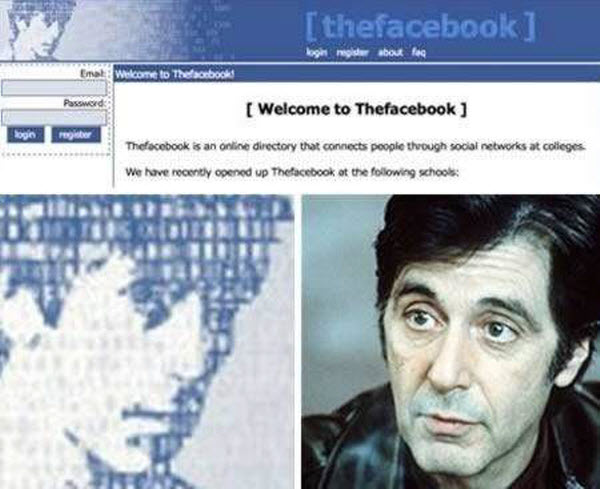
Early Legal Challenges
With the launch of Facebook, Zuckerberg found himself facing legal troubles as Harvard students Divya Narendra, Cameron Winklevoss, and Tyler Winklevoss sued him, claiming he stole their idea. The legal battle continued for four years, and Zuckerberg ultimately settled by paying $65 million to Narendra and the Winklevoss twins, along with granting them a stake in the company.
The World’s Third Most Popular Website
Facebook is the third most popular website globally, following Google and YouTube. Statistics show that 71% of Americans use Facebook, a significant number compared to the 38% using Instagram and the 23% using Twitter. Over a quarter of a billion photos have been uploaded to Facebook servers, with five new accounts being created every second. A Pew Research Center survey indicates that women are more active on Facebook than men, and 98% of users access the platform via smartphones. Surveys also reveal minimal political disparity among users, with 35% identifying as conservative, 34% as liberal, and 29% as moderate. Over half of Facebook users visit the site multiple times a day, with an average daily engagement of 58 minutes.
Facebook’s Global Reach Beyond the U.S.
Despite being an American company, the United States is not the largest user of Facebook. India leads with 260 million users, while the Philippines and Indonesia show significant growth. Consequently, more than half of Facebook users use languages other than English. The platform supports over 100 languages to accommodate diverse user needs. Most users are active between 8 AM and 10 PM.
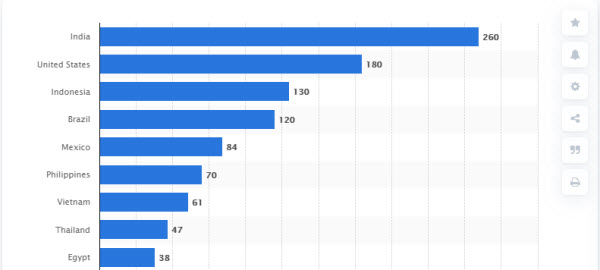
Facebook and Brain Scanning Studies
Some might think there’s confusion, but it is a real phenomenon: Facebook has become addictive for some users, leading researchers to explore whether “Facebook addiction” affects the brain similarly to drug addiction. A study involving 20 volunteers found that those with higher addiction scores showed stronger brain responses to Facebook-related symbols, similar to reactions seen in cocaine users. However, it’s important to note that this comparison is not entirely accurate, as social media addiction involves a complex mix of habits and social factors rather than drugs.
Facebook’s User Surveillance
Reporting false or misleading content is a significant issue on social media networks. To address this, Facebook developed a system to identify and track problematic users based on their reporting behavior. The system, designed over a year and implemented in 2018, rates users’ trustworthiness on a scale from 0 to 1 based on their reporting patterns. However, the exact details of how these metrics and algorithms work remain unclear.
Shadow Profiles
In 2018, Mark Zuckerberg testified before Congress about user privacy concerns, including the controversial “shadow profiles”—data collected on individuals who do not use Facebook but have friends who do. Facebook creates these profiles when users upload their contacts’ details, tracking individuals who avoid the platform but are identified through their friends’ data. Although the idea of connecting people based on phone contacts seems legitimate, it raises significant privacy concerns.
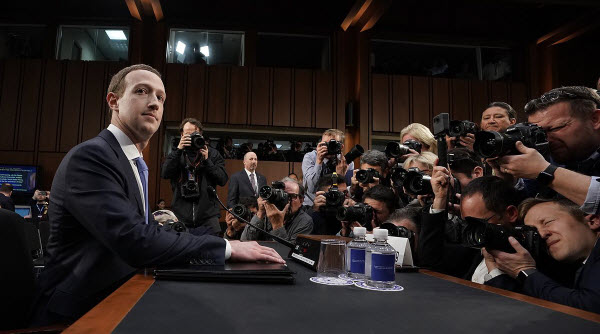
Secret Texts and Recordings
In 2019, former Facebook employees revealed that their job involved copying voice recordings from Facebook Messenger conversations. This practice was a shock, as it represented a significant invasion of user privacy. Despite claims that this was done with users’ consent, no clear policy allowed users to approve the recording of their conversations. Facebook eventually admitted to this practice, though it justified it as part of testing artificial intelligence for speech recognition. This admission, while explaining the technical purpose, implicitly acknowledges a breach of user privacy.
Mental Health Issues Among Content Moderators
Content moderators dealing with graphic and illegal content on Facebook face significant mental health challenges. A 2019 investigation by The Verge revealed that moderators in Arizona experienced severe stress and psychological trauma from viewing disturbing material, including child abuse, racism, and violence. This environment led some to substance abuse and other coping mechanisms, highlighting the severe impact of their job on their mental well-being.
Unintentional Involvement in Criminal Acts
In 2014, a tabloid published a post on Facebook accusing a woman of kidnapping children for use in black magic. This led to a violent attack on a Brazilian woman named Fabiane Maria de Jesus, who was mistakenly identified as the person in the post. Despite the police clearing her of any wrongdoing, she died two days later from the attack. Facebook denied responsibility, claiming it did not err in its moderation. However, the incident highlighted the dangerous consequences of misinformation on the platform.

FBI’s Use of Facebook for Espionage
In 2019, Business Insider reported that the FBI used Facebook to run spy ads targeting Russian users, inviting them to a site associated with the FBI’s counterintelligence program. The ads, which insulted President Putin, aimed to recruit informants. Despite seeming unusual, some Russians responded to the ads. The FBI’s rationale was that the large number of active Russian users posed a security threat.
Tracking Menstrual Cycles and Sexual Activities
In 2019, it was discovered that Facebook had been tracking women’s menstrual cycles and sexual activities through apps like Maya and MIA Fem. These apps, designed for health and contraception management, shared users’ personal data with Facebook. This data included information about menstrual cycles and contraception use, which Facebook exploited for targeted advertisements. This revelation raised significant privacy concerns.
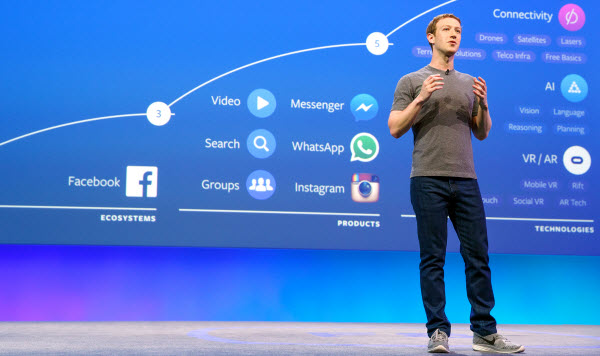
Monitoring Financial Activities
In 2018, Facebook approached several banks requesting access to users’ financial information to monitor account balances and credit card purchases. Despite the potential for increased visibility in Messenger’s billion-user marketplace, banks declined the offer due to privacy concerns. They were unwilling to accept the idea of Facebook monitoring their customers’ financial transactions, despite reassurances about data usage.
